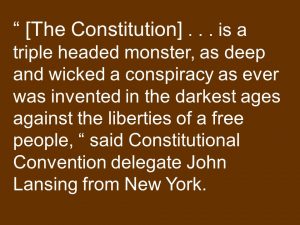U.S. Constitution
See other U.S. Constitution Articles
Title: It Did What it Was Written to Do
Source:
Eric Peters Autos
URL Source: https://www.ericpetersautos.com/201 ... did-what-it-was-written-to-do/
Published: Jan 6, 2018
Author: Eric
Post Date: 2018-01-08 09:46:25 by Deckard
Keywords: None
Views: 1432
Comments: 5
A great many people – especially conservatives – reverence the Constitution, consider that it has been abused and that if only the doctrines expressed within were revived and respected, all would be well with America again. This, of course, is a kind of children’s bedtime story – and approximates reality to about the same degree as the story of the Three Little Pigs. The Constitution was peddled and imposed on us by men like Alexander Hamilton, a grasper after power who very openly loathed the ideas expressed by men like Jefferson in his Declaration (and even more so in his Virginia and Kentucky Resolutions). Hamilton and his faction – they were called Federalists, which meant then what it means today – intended to create a centralized government on the British model, but without a hereditary monarch. The Bill of Rights was just barely added, in order to sooth the (rightly, as it turned out ) suspicious, such as George Mason of Virginia. Patrick Henry smelled a rat. At any rate, the fact remains that the Constitution was written with great calculation by lawyers – who are trained in and well understand the meaning and potential use of words – in such as way as to assure the expansion of federal power via (among other things) the purposely open-ended Commerce Clause and deliberately nebulous phrases such as “general welfare” that can be – and have been – interpreted to mean . . . anything those who control the levers of the federal government wish it to mean. Including – as actually happened during the Roosevelt Years – that a man farming on his own land whose produce never leaves his land let alone the state is nonetheless subject to federal regulation, because his actions “affect” Interstate Commerce. In the same manner, Americans are forced to pay for other people’s retirement (and in their turn, forcing others to pay for theirs) and this is characterized as a “contribution.” Regardless – the debate ought not to be over a piece of paper and what it does or does not legalize. A thing can be morally vile and entirely legal. The debate ought to be over the question of rights vs. conditional privileges. And whether the immoral can ever – rightfully – be lawful. Does a man have an absolute right to be left in peace, so long as he himself is peaceful – or not? If not, then we do not have rights but conditional privileges, subject to modification at any time – and morality is merely a question of legality. In which case, the Israelis did Adolf Eichmann a grievous injustice when they hanged him for doing as German law required. The Constitution is an immoral document. It explicates a litany of conditional privileges, subject to modification at any time. That this is done in an orderly manner, via “constitutionally” prescribed mechanisms, does not make the doing of it morally legitimate. It merely legalizes it. Theft remains theft. Slavery, to whatever degree, remains slavery. The Constitution articulates in flowery prose the means by which rights are to be suborned and transformed into conditional privileges; for example, the gauzy “will of the people” will be “represented” by a handful of actual people called politicians and bureaucrats and judges – whose opinions become binding on “the people.” But this is lawyer-talk. There is no “people.” No single body, imbued with a single consciousness and – morally, the key point – unanimous in its feeling, capable of giving unanimous free consent to an action of the government. Without such unanimity and free consent you have the trampling of the will of individual people, which is contrary to their rights and which therefore can never be moral. This idea that the otherwise immoral act – when performed freelance, by an individual – becomes not merely legal but moral when it is done via “representatives” of “the people” or via the false proxy of the ballot box is the despicable doctrine at the very core of the immoral Constitution and its intended subordination of the individual. It is responsible for everything the authors of the thing intended – and what they intended was unlimited government. A government which may- in principle – do anything it likes, so long as it is done via “the people’s representatives” and after a vote on the matter. Is this not abundantly the fact? Is there any sphere of our lives which the government may not, in principle, probe? You may not even take medicine to ameliorate the ills of your own body without the government’s supervision – and punishment, if you take issue with its prescriptions. The government asserts ownership over your body. You are not free to associate. You are not free to say “no, thanks.” The government can do whatever it likes, so long as a law is passed or a judge decrees. It is not accidental. But it can be rooted out by insistence upon the use of plain, simple language not subject to “interpretation” – i.e., the sort of clear, precise language lawyers such as those who wrote the Constitution do their best to avoid using, in order to use language against us. Viz: “The people” – it sounds dreamy – have no “will” – and are certainly not sovereign – because no such creature as “the people” exists in fact; the term is a rhetorical device used by lawyers to legitimate the trampling of the rights of individual people – who do exist and have rights. These must be respected – morally as well as legally – else they are merely conditional privileges subject to modification or outright revocation at the whim of any politician, or group of them – or court – which declares it is acting on behalf of “the people.” In fact, of course, these politicians and so on are acting on behalf of themselves. Or a clique. They cannot ever be acting on behalf of all, in which case the rights of some are necessarily abused. And if is permissible to abuse the rights of some, then the rights of none are secure – are anything other than conditional privileges. As intended. Hamilton desired a “vigorous” central government, wanted to hang Americans who questioned the moral right of the federal government – of any government – to steal their property. Supported slavery – so long as it was done according to legalprocess and called by another name. But that is mere history. The question at hand – whether here in the United States or anywhere on this Earth – is whether the individual has rights that others are bound to respect – morally as well as legally. Or, not. Is your physical body is your exclusive property – to do with as you see fit? If it is, then you are a free man. If it is not, you are a slave – the degree of your slavery being morally (as well as logically) immaterial. Theft is theft. Rebranding legalized theft as “taxes” doesn’t change the nature of the thing. A person’s property is taken from him by violence. This is theft, by whatever name. Moral human interactions are either voluntary and consensual – the concept of free association – or they are not. When a man is forced to interact with other men in any way whatsoever, he is no longer a free man. Do you agree – or disagree – with the proposition that the only moral basis for interfering with any man is when he causes tangible harm to the person or property of another free man? If you do not agree, then you believe in conditional privileges . . . as articulated in the Constitution.  (8 images)
(8 images)
Post Comment Private Reply Ignore Thread
Top • Page Up • Full Thread • Page Down • Bottom/Latest
Begin Trace Mode for Comment # 1.
#1. To: Deckard (#0)
Or, not. Is your physical body is your exclusive property – to do with as you see fit? If it is, then you are a free man. If it is not, you are a slave – the degree of your slavery being morally (as well as logically) immaterial. Is your physical body is your exclusive property – to do with as you see fit? If it is, then you are a free man. If it is not, you are a slave – the degree of your slavery being morally (as well as logically) immaterial. Moral human interactions are either voluntary and consensual – the concept of free association – or they are not. When a man is forced to interact with other men in any way whatsoever, he is no longer a free man. Do you agree – or disagree – with the proposition that the only moral basis for interfering with any man is when he causes tangible harm to the person or property of another free man? If you do not agree, then you believe in conditional privileges . . . as articulated in the Constitution. You have posted a set of questions and a challenge here that I will rise to meet on your terms. Let me take the specific points of your post that interested me and line them up for responses: (1) The insistence on plain and simple language. RESPONSE: Very well. You want "plain, simple, clear, precise language, from a lawyer no less, in response to your questions? Here it is. (2) The question at hand – whether here in the United States or anywhere on this Earth – is whether the individual has rights that others are bound to respect – morally as well as legally. ANSWER: The individual only has rights to a certain extent. Yes, we do respect individual rights, but no individual right is ever absolute. No individual right CAN ever be absolute for two reasons, one political and one natural. The political reason is that any absolute right will very quickly become the loose thread that any individual can pull to free himself from the law of the state. And then others will follow that same example - for nobody wants to be bound by laws against his OWN conduct: we want laws to bind OTHERS, not ourselves. Everybody will pull that thread, and the state will come unravelled. If taxes were voluntary, only fanatics and fools would pay them - and the state will immediately collapse for want of resources. If the right to life is absolute, the police could not shoot violent criminals and nobody could ever be drafted or, if already in the military, to be punished (executed) for running away from battle. And that would simply mean that the army would fall apart on the battlefield. That's the political reason. The natural reason is that two men are stronger than one, ten men are stronger than three, and fifty men are stronger than ten, or one. Which means that any gang of three men can always enslave one man, and either kill him or beat him into submission, or take whatever he has. This cannot be changed, and it as true of chimps and gorillas or wolves or lions as it is of men. Nature is real and invincible. "Rights" are ideas, and they always fail before superior force. The ability to cooperate and subordinate themselves is what makes the gang of five men all not just stronger than one man, but also richer and better off: they take from him and distribute his stuff to themselves. Sure, the ringleader gets MORE, and the lowest brave gets less, but the lowest brave still has more than the individual who has been attacked and stripped of his stuff. Might may not make "right" in a religious sense, but might makes rules and rulers in real life, not just for men but for animals. So, do individuals have rights? As a matter of nature they have the "right" to what they can take for themselves - and part of nature is that two and three, therefore, can take from one. And will, inevitably. Which is the primary reason we have to band together and subordinate ourselves to a state of some sort. The second most dangerous force on earth to a man, BY FAR, is other men. There is no remedy to that on earth other than to band with other men for mutual protections. And that MEANS subordination, a pecking order, the sacrifice of individual rights. Any man, today, can live in complete liberty: walk into the woods of Canada or Siberia, or the jungles of Africa or Brazil, or the high mountains of various places, or get on a boat and sail off into the open seas, or walk off into the desert. Alone in the desert, in the mountains, in the forest, on the sea - just the man and nature and nature's God, no other men to answer to...or rely upon. Freedom is always right there. So many men crave it, so why don't more men walk away from civilization? Because THE most dangerous force on earth is nature itself. Live among men, and you have such rights as men will grant you - because the might of men comes from their minds, and people understand very quickly that subordination of the self is necessary, to a degree, in order to survive. But if you cannot abide any abridgment of your imagined personal sovereignty, you can walk away from civilization, as any man can. Wide-open nature is there, there is still a frontier. Any man can live completely free of other men...and very probably die within two to three months if he tries it (in temperate forests) - within a few days if he tries it on the open sea, in the high sierra, or in the desert. A man may eke out an existence in the forest until winter - then he dies. In the jungle, he will be claimed by disease and insect bites in a week or two. So, the truth is that no, individuals do not have rights in the abstract. Individuals have the rights that their group grants them, and no more than that. If they don't want to be limited, they can always go live alone in the wilderness. Which means they can commit suicide by walking away from men and dying of exposure, starvation, disease or dehydration...or animal attack...out in the wilderness. (3) Is your physical body is your exclusive property – to do with as you see fit? If it is, then you are a free man. If it is not, you are a slave ANSWER: Obviously it isn't. You can't miss even one breath. You do not will yourself into existence, and you cannot take one breath more than God grants you. You do not own your body. You cannot grant yourself life. You cannot will away disease or the elements. You are a slave to your lungs and your digestive tract and the need to cover and heat yourself. You are a slave to the needs of your body, and you are completely powerless to change any of those needs. Nor can you turn off your nerve endings to cease feeling the pain inflicted on you by nature if you do not have what you need. Mankind - the rest of humanity you face - is simply the most intelligently organized force of nature that you encounter. You either acknowledge its presence and obey its rules, or it kills you, just like any other force of nature. You do not own your body at all, and you never will, not in this life, and not in the next. Does that make you a slave? YOU say that it does. I will say that everybody is a "slave" to his or her lungs and digestive tract and skin, in the sense that nobody is, or ever can be, truly "free". When I use the the word slave, I mean that a person is under the ownership and direct (and potentially brutal) control of another individual person. To call taxpaying or the obligation to perform military service or pay taxes in a democratic republic "slavery" is to not use words clearly or precisely, but rather, to indulge in precisely the sort of twisting "interpretation" of language that the original author abhorred. Essentially, to postulate a state of absolute individual human liberty, which has never, will never, and CAN never exist as "freedom" and to cast anything less than that as "slavery" is an abuse of language. (4) Similarly this business about "forced interaction": When a man is forced to interact with other men in any way whatsoever, he is no longer a free man. ANSWER: Let us consider the matter of bowel movements. About 8 billion people have at least one every day of their lives. "Everyone Poops" is an amusing young childhood book based on a fundamental truth. The problem with poop is not simply that it is messy and it stinks. It is also infectious, and if human feces are not properly disposed of, will cause the neighbors to become sick in various ways. In even the most basic state of nature (which mankind left behind ten thousand years ago, human beings are forced to interact with other human beings, involuntarily, by the fact of our excretory functions. Everybody shits, daily, and your shit can make me sick and kill my kids. So no, you can't just be free to live and crap wherever you want to. Maybe you are willing to limit all of our life expectancies to 22 or 23 years of age, if that, but I am not willing to let you. Nor will the rest of the tribes. We will pick up sticks and FORCE YOU to use your own body in a way that doesn't shit in the water supply, and doesn't leave your crap all over the camp. You may think you have some abstract right as a human being to not have to interact with the rest of us when we compel you, under penalty of being beaten or killed, to go outside of the camp to shit, but it's not a matter of having to persuade you. Whether you are persuaded or not, and whether you want to or not, you are going to be compelled by physical force to only excrete in certain places - in every society on earth. If you can't abide such forced interactions, then go die in the woods alone. If the fact that you do have to interact with other men makes you not a free man, then nobody is free but hermits who do manage to survive in the forest alone. If you're going to define freedom in absolute terms, then you're unfree, and I'm unfree. Shoulder shrug. Oh well. That's the way it is. I'm not free to crap where I want. I'm not free to not breathe either. (5) Do you agree – or disagree – with the proposition that the only moral basis for interfering with any man is when he causes tangible harm to the person or property of another free man? ANSWER: I disagree with it, obviously.
#2. To: Vicomte13 (#1)
DAYUM,but you are good when religion isn't added to the mix! It is factually impossible to create a perfect government to govern a free people because people are not perfect. Not even thee and me. So,compromise is the default position we MUST start from. The trick,and the wisdom,comes from understanding where to compromise and by how much. Not enough and you have a police state. Too much and you have anarchy.
Top • Page Up • Full Thread • Page Down • Bottom/LatestBut it can be rooted out by insistence upon the use of plain, simple language not subject to “interpretation” – i.e., the sort of clear, precise language lawyers such as those who wrote the Constitution do their best to avoid using, in order to use language against us. ... The question at hand – whether here in the United States or anywhere on this Earth – is whether the individual has rights that others are bound to respect – morally as well as legally.
Replies to Comment # 1.
End Trace Mode for Comment # 1.
[Home] [Headlines] [Latest Articles] [Latest Comments] [Post] [Mail] [Sign-in] [Setup] [Help] [Register]






